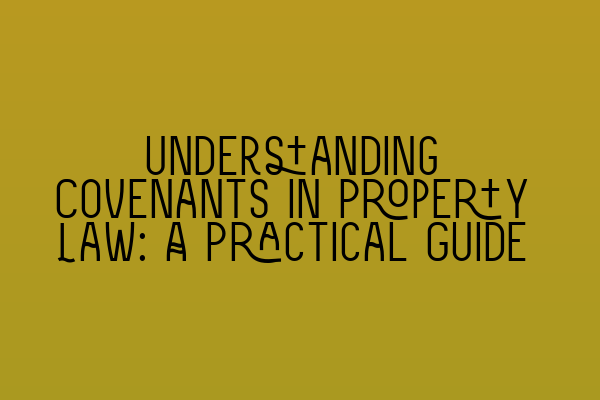Understanding Covenants in Property Law: A Practical Guide
Welcome to SQE Property Law & Land Law! As a solicitor, it is essential to have a comprehensive understanding of property law to provide effective legal advice to clients. One important aspect of property law is covenants. In this blog post, we will delve deep into the world of covenants, explaining what they are, their types, their enforcement, and their implications for both property owners and solicitors. So, let’s get started!
What are Covenants?
Covenants, in property law, are legally binding agreements between parties that dictate how a property should be used or restricted. They are usually included in property deeds and can impose obligations or limitations on the property owner or neighboring property owners. These provisions are put in place to maintain the value and integrity of the property and its surrounding areas.
Types of Covenants
There are two main types of covenants: positive covenants and restrictive covenants.
Positive covenants require the property owner to do something specific, such as maintain a fence or contribute to the maintenance of shared facilities like roads or gardens. These covenants are designed to ensure the proper upkeep of the property and its surroundings.
Restrictive covenants, on the other hand, prevent the property owner from doing certain things. For example, they may restrict the type of structure that can be built on the property or prohibit certain activities like running a business from the premises. The purpose of these covenants is to protect the character and value of the property and the surrounding area.
Enforcement of Covenants
Covenants can be enforced in a few different ways. The first option is through the courts, where a party can seek an injunction to stop a breach of the covenant or sue for damages caused by the breach. However, this can be a lengthy and expensive process.
Alternatively, covenants can also be enforced by neighboring property owners. In this case, they may have the right to take legal action against a property owner who is breaching a restrictive covenant. The neighbor can seek an injunction or damages to rectify the breach.
Implications for Property Owners
For property owners, it is crucial to be aware of any covenants that may impact their use of the property. Before purchasing a property, it is recommended to conduct thorough due diligence and review the property’s title deeds and any associated agreements to identify any existing covenants.
If a covenant is discovered, the property owner should ensure that they understand its implications and whether they are willing to comply with its terms. Failure to do so can result in legal action, damages, or an injunction, which can not only be costly but also significantly impact the property’s value and future use.
Implications for Solicitors
As solicitors, it is our responsibility to guide our clients through the complexities of property law and ensure they are fully informed about any covenants that may affect them. By conducting thorough research and review, we can highlight any potential issues or obligations related to covenants, allowing our clients to make informed decisions about their property transactions.
In addition, solicitors play a crucial role in advising clients on the enforcement and defense of covenants. We can help clients initiate legal action if a covenant has been breached or defend against claims made by neighboring property owners. Our expertise in property law and understanding of the intricacies of covenants ensures that our clients’ rights and interests are protected.
Conclusion
Understanding covenants in property law is essential for both property owners and solicitors. By comprehending the types of covenants, their enforcement, and the implications they have, we can navigate the complexities of property transactions and provide valuable legal advice to our clients.
If you’re preparing for SQE exams and need assistance, check out our related articles for practice exam questions (SQE 1 Practice Exam Questions) and preparation courses (SQE 1 Preparation Courses and SQE 2 Preparation Courses). Stay up-to-date with the latest SRA SQE exam dates (SRA SQE Exam Dates).
At SQE Property Law & Land Law, we are here to help. Contact us to discuss your property law matters and how we can assist you in navigating the complexities of covenants and other legal aspects of property ownership.
